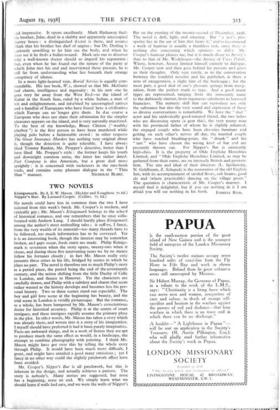TWO NOVELS
No novels could have less in common than the two I have selected from this week's batch. Mr. Cooper's is modern, and cynically gay ; Mr. Mason's Konigsmark belongs to the school of historical romance, and one remembers that he once colla- borated with Andrew Lang. I should hardly place Konigsmark among the author's most enthralling tales ; it suffers, I fancy, from the very wealth of its materialâtoo many threads have to be followed, too much information has to be conveyed. Yet it is an interesting book, though the interest may be somewhat broken, and gaps occur, fresh starts are made. Philip Konigs- mark is seventeen when the story opens, twenty-two when it closes, and during those five intervening years we by no means follow his fortunes closely ; in fact Mr. Mason really only presents three crises in his life, bridged by scenes in which he plays no part. The novel is therefore not so much Philip's story as a period piece, the period being the end of the seventeenth century, and the action shifting from the little Duchy of Celle to London, and thence to Hanover. Yet the characters are carefully drawn, and Philip with a subtlety and charm that seem rather wasted as the history develops and becomes less his per- sonal history. Two or three scenes stand out especially. The boy and girl love scene at the beginning has beauty, and the trial scene in London is vividly picturesque. But the romance, as a whole, has been hampered by Mr. Mason's conscientious desire for historical accuracy. Philip is at the centre of court intrigues, and these intrigues rapidly assume the primary place in the plot. In other words, Mr. Mason has taken a story which was already there, and woven into it a story of his imagination. I myself should have preferred it had it been purely imaginative. Facts are awkward things, and in a work of fiction they are apt to produce much the same effect as would, in a landscape, the attempt to combine photography with painting. I think Mr. Mason might have got over this by telling the whole story through Philip. It would have been much more difficult, I grant, and might have entailed a good many omissions ; yet I fancy in no other way could the slightly patchwork effect have been avoided.
Mr. Cooper's Nipper's Bar is all patchwork, but this is inherent in the design, and actually achieves a pattern. The story is nobody's. Many stories are suggested, but none has a beginning, none an end. We simply learn what we should learn if walls had ears, and we were the walls of Nipper's Bar on the evening of the twenty-second of December, 1936. The novel is deft, light, and amusing. But " a jest's pro- sperity lies in the ear of him that hears it," and to recommend a work of humour is usually a thankless task, since there is nothing else concerning which opinions so differ. Mr. Cooper's humour pleases me, but it is much closer to Ai, stey's than to that of Mr. Wodehouseâthe Anstey of Voces l'opuli. Where, however, Anstey limited himself entirely to dialogue, Mr. Cooper now and then goes behind his persons and gives us their thoughts. Only very rarely, as in the conversation between the youthful novelist and his publisher, is there a note of exaggeration, a slight hint of the burlesque ; for the most part, a good deal of one's pleasure springs from recog- nition, from the perfect truth to type. And a good many types arc represented, ranging from the innocently inane to the dubiously sinister, from ingenuous subalterns to harassed financiers. The mimetic skill that can reproduce not only the substance but also the very sound and expression of these so diverse conversations is remarkable. We have the " dud " actor and his sardonically good-natured friend, the two ladies who are discussing opera (a gem this), the very young man with his provincial father of whom he is slightly ashamed, the engaged couple who have been choosing furniture and getting on each other's nerves all day, the married couple who have reached breaking-point, the " drunk " and his " tart " who have chosen the wrong kind of bar and are
presently thrown out. For Nipper's Bar is eminently high-class. It is the property of Olde Englishe Hostelries Limited, and " Olde Englishe Hostelries Limited, as may be gathered from their name, are an intensely British and patriotic firm. The aim and ideal of their directors (L. Spoliansky, N. Goldbaum, Z. Schtmck) is the restoration of the old English Inn, with its accompaniment of sanded floors, oak beams, good ale and (where practicable) dancing on the village green." The quotation is characteristic of Mr. Cooper's manner. I myself find it delightful, but if you see nothing in it I am
afraid you will sec nothing in his book. FORREST REID.






































 Previous page
Previous page